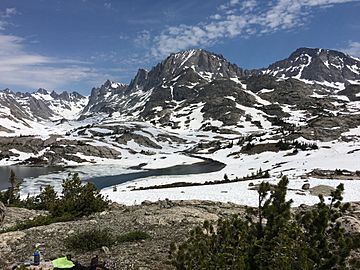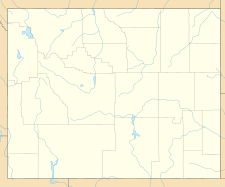Fremont Peak (Wyoming) facts for kids
Quick facts for kids Fremont Peak |
|
|---|---|

Fremont Peak at center from near Island Lake
|
|
| Highest point | |
| Elevation | 13,751 ft (4,191 m) |
| Prominence | 1,184 ft (361 m) |
| Geography | |
| Parent range | Wind River Range |
| Topo map | USGS Fremont Peak South |
| Climbing | |
| First ascent | 1842 Fremont and others |
Fremont Peak is a tall peak located in Wyoming, USA. It is the third highest peak in the state. Only Gannett Peak and Grand Teton are taller. This mountain sits on the border between Fremont and Sublette counties. It is part of the Wind River Range.
The peak is named after John C. Fremont, an American explorer. He climbed the mountain with his team in August 1842. At that time, people thought Fremont Peak was the highest mountain in the Rocky Mountains. However, there are actually over 100 higher peaks in the Rockies.
About Fremont Peak
Fremont Peak is a very important mountain. It is located on the Continental Divide. This means that water falling on one side flows to the Pacific Ocean. Water on the other side flows to the Atlantic Ocean. It is also the second highest peak in the remote Wind River Range. Only Gannett Peak is higher in this range.
The eastern side of Fremont Peak is in the Fitzpatrick Wilderness. This area is part of the Shoshone National Forest. The western side is in the Bridger Wilderness. This area belongs to the Bridger-Teton National Forest. A large ice formation called the Upper Fremont Glacier can be found on the northern slopes of the mountain.
Climbing Fremont Peak
Climbing Fremont Peak is a big adventure. Because it is far away and hard to reach, most climbers take several days. They usually spend three to five days hiking to the mountain. Then they climb to the top. After reaching the summit, they hike all the way back to where they started.
Safety on the Mountain
When visiting the Wind River Range, it is important to be aware of certain things. Bears live in this area, so hikers must take precautions. Other things to watch out for include bugs and wildfires. The weather can also change quickly. Hikers might face snowy conditions or very cold temperatures at night.
 | Misty Copeland |
 | Raven Wilkinson |
 | Debra Austin |
 | Aesha Ash |


